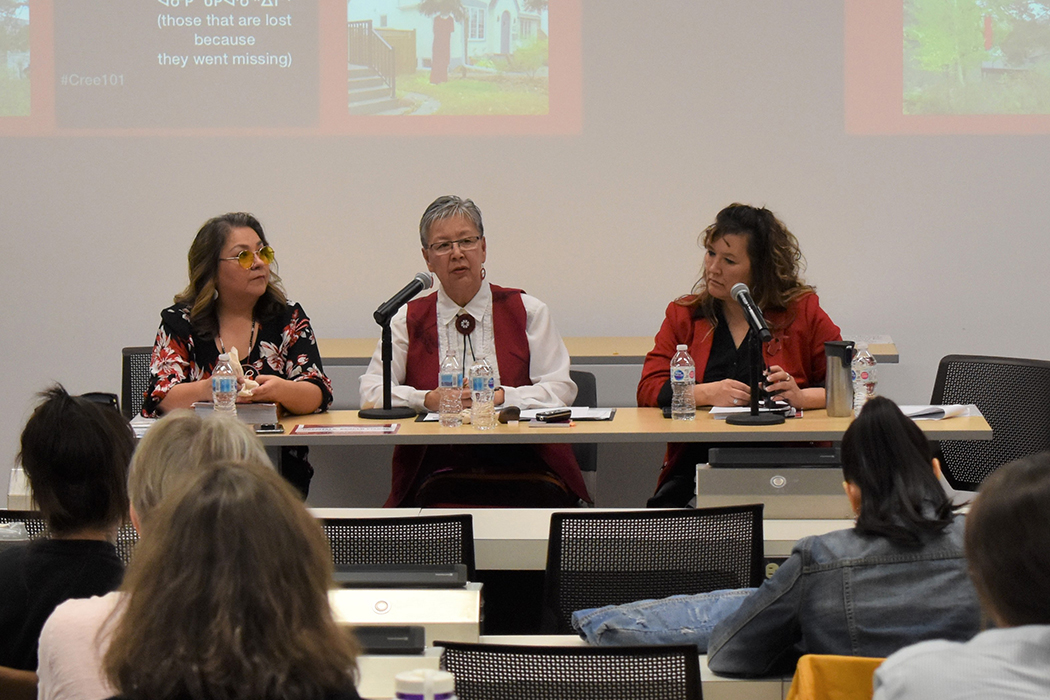
Amendments to legislation protect vulnerable and Indigenous women
Indigenous women are three to four times more likely than other women to be sexually assaulted or murdered, and seven times more likely to be targeted by serial killers.
By Sarah VermetteThese statistics are a driver behind the Missing and Murdered Indigenous Women and Girls (MMIWG) inquiry, as well as recent legislation amendments.
“The gender dimension to the effects of colonization of Aboriginals on women has been overlooked in the justice system,” Canadian Senator Lillian Dyck noted.
Dyck was one of the panelists on a discussion hosted by the University of Saskatchewan (USask) Division of Social Accountability (DSA) on March 11. The panel was one of a series of discussions presented by the DSA, intended on racism in the health care system.
The March 11 presentation, The MMIWG calls for justice and their relation to health, was about gender-based violence. Panelists included Dyck and Darlene Okemaysim-Sicotte.
Okemaysim-Sicotte, from Beardy’s & Okemasis First Nation, received the Queen Elizabeth II Diamond Jubilee Medal in January 2013 for her volunteerism over 14 years with the Saskatoon concerned citizens group, Iskwewuk Ewichiwitochik (Women Walking Together). The group focuses on missing and murdered Indigenous women and girls. She got involved after seeing a female relative, who was murdered, negatively portrayed in the media.
The National Inquiry into Missing and Murdered Indigenous Women and Girls (NIMMIWG), launched in 2016, examines systematic violence against Indigenous women.
Okemaysim-Sicotte drew awareness to important factors in the NIMMIWG final report, pointing out specifically that special measures must be taken to protect Indigenous girls and women.
“The trauma that has occurred historically within Indigenous communities, and how trauma is inherited through generations, makes Indigenous girls and women especially vulnerable,” said Okemaysim-Sicotte.
Dyck, a member of the Gordon First Nation, is well known for advocating for equity in the education and employment of women, Chinese Canadians and Aboriginal people. She is the first female First Nations senator and first Canadian-born Chinese senator, and is both a USask alumna and previous faculty member.
“Recent studies show applying the Gladue principle to offenders puts women at increased risk for sexual violence,” said Dyck. The Gladue provision of the criminal code focuses on rehabilitation over sentencing.
Dyck has been dedicated to amending the criminal code to better protect vulnerable persons, women, and in particular, Indigenous women. She successfully advocated to amend a clause in bill C-75, which includes amendments related to intimate partner violence, among other things, in the Criminal Code and other areas of justice.
Adjustments made to bill C-75 include: amending the definition of “intimate partner” to include dating partners and members of the victim’s family, as well as ensuring judges give primary consideration to sentencing objectives and consider the vulnerability of female persons who are victims and their circumstances.
These amendments counteract inherent bias in the criminal justice system that has resulted in lighter sentences handed down to those who commit violent crimes against intimate partners and Indigenous women.
Saskatchewan has a higher rate of domestic violence than any other province.
Dyck presented that intimate partner violence/domestic violence is serious, but is not adequately recognized by the justice system. The amendments to bill C-75 honour our MMIWG, all women and vulnerable persons by protecting them specifically in our laws.
